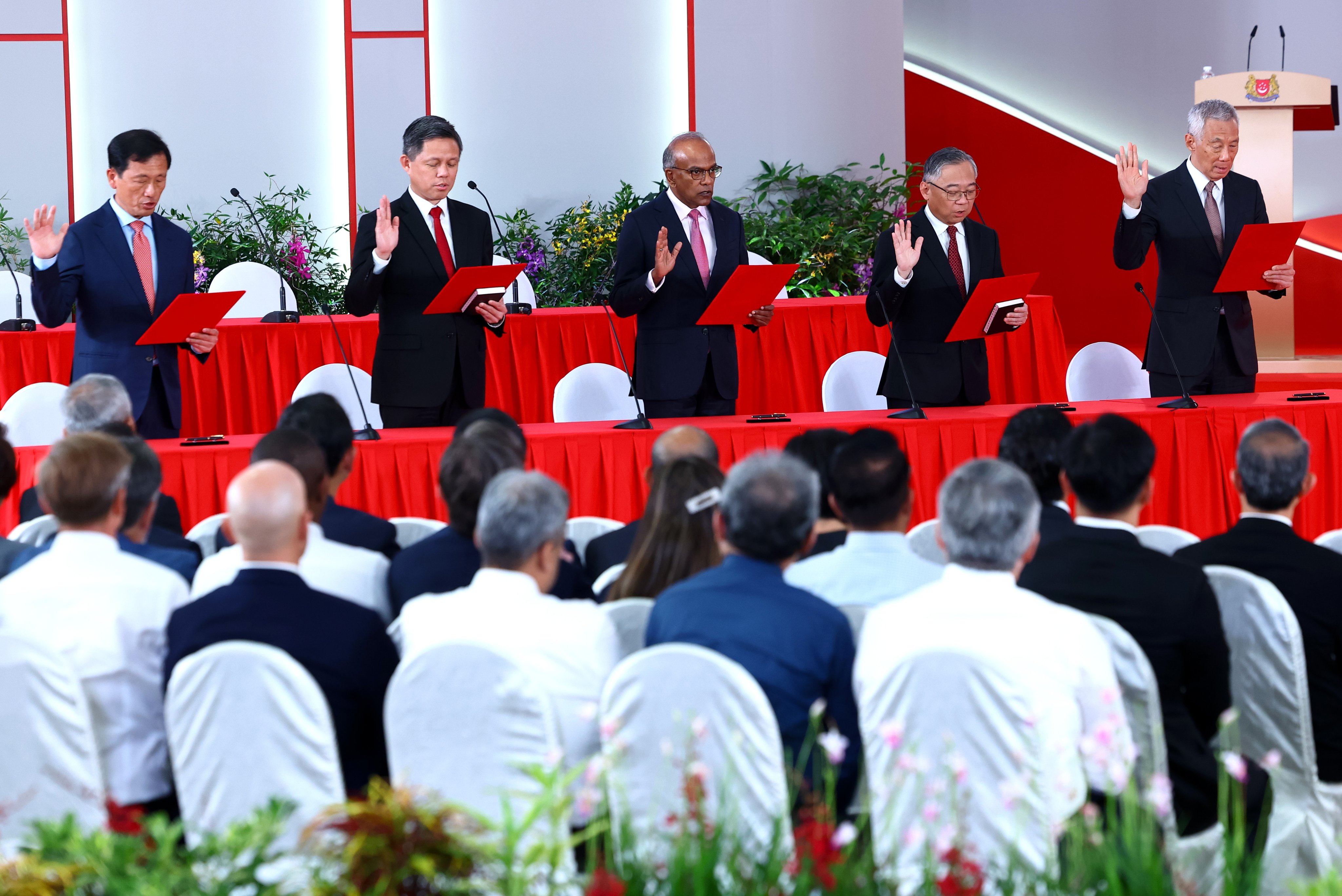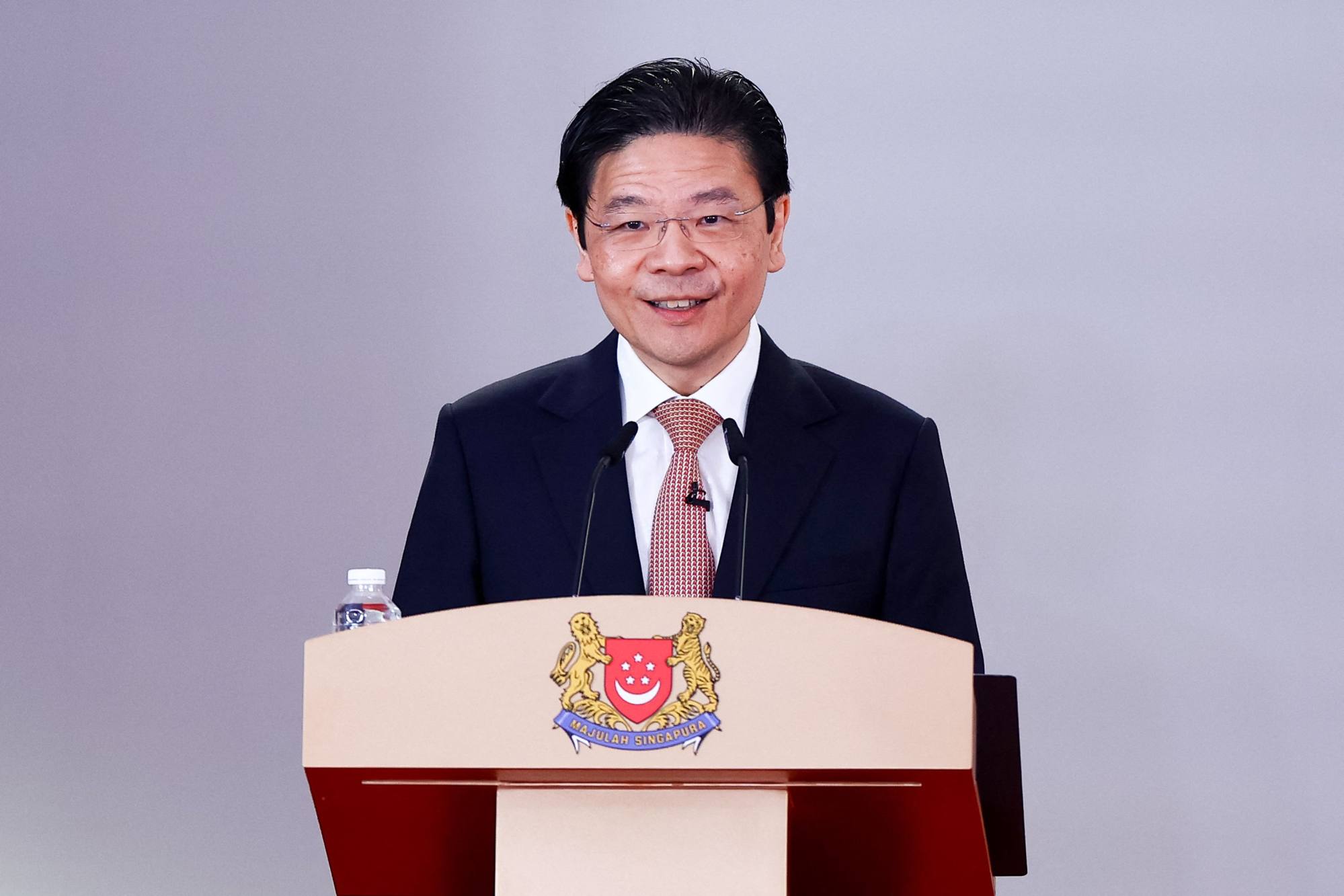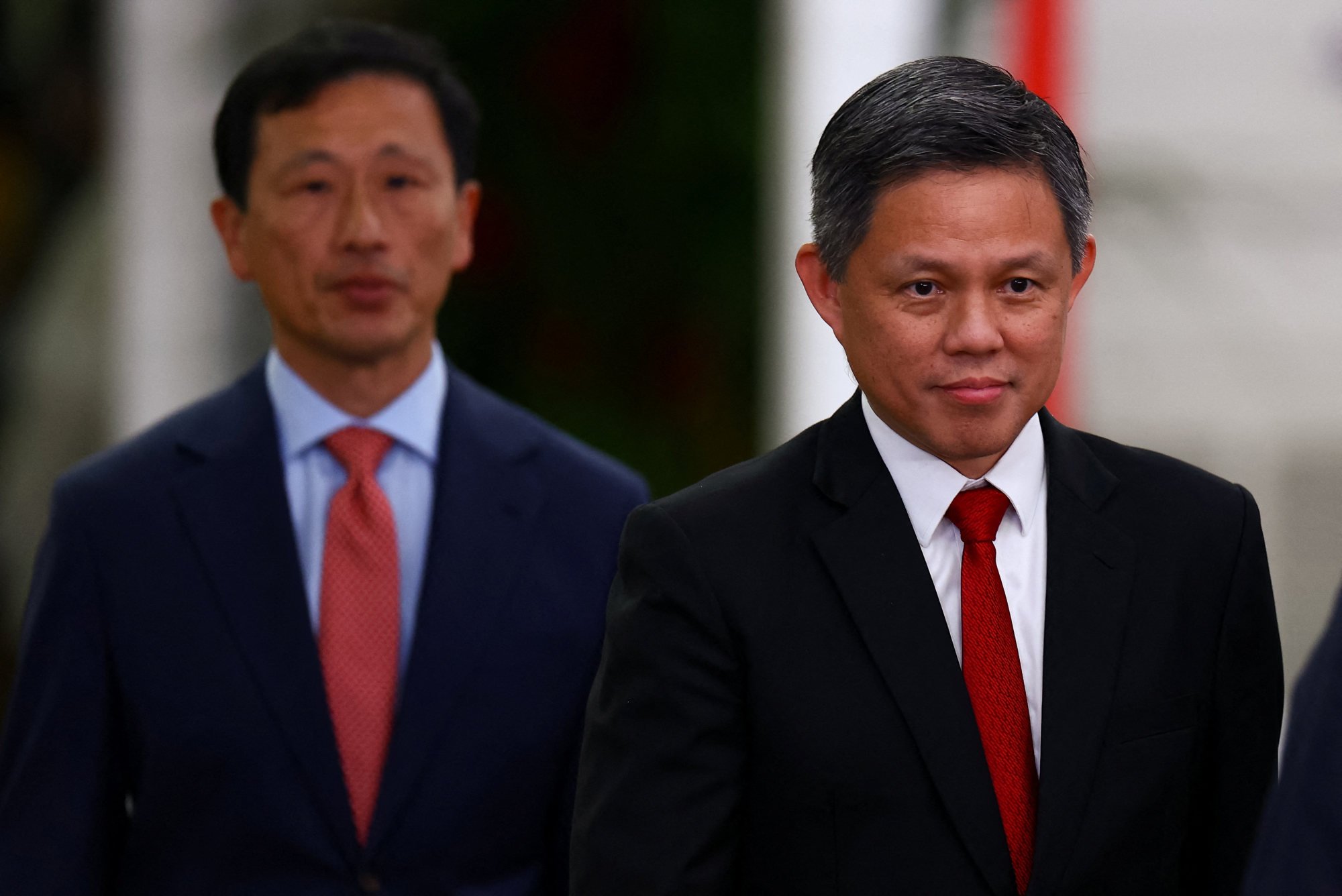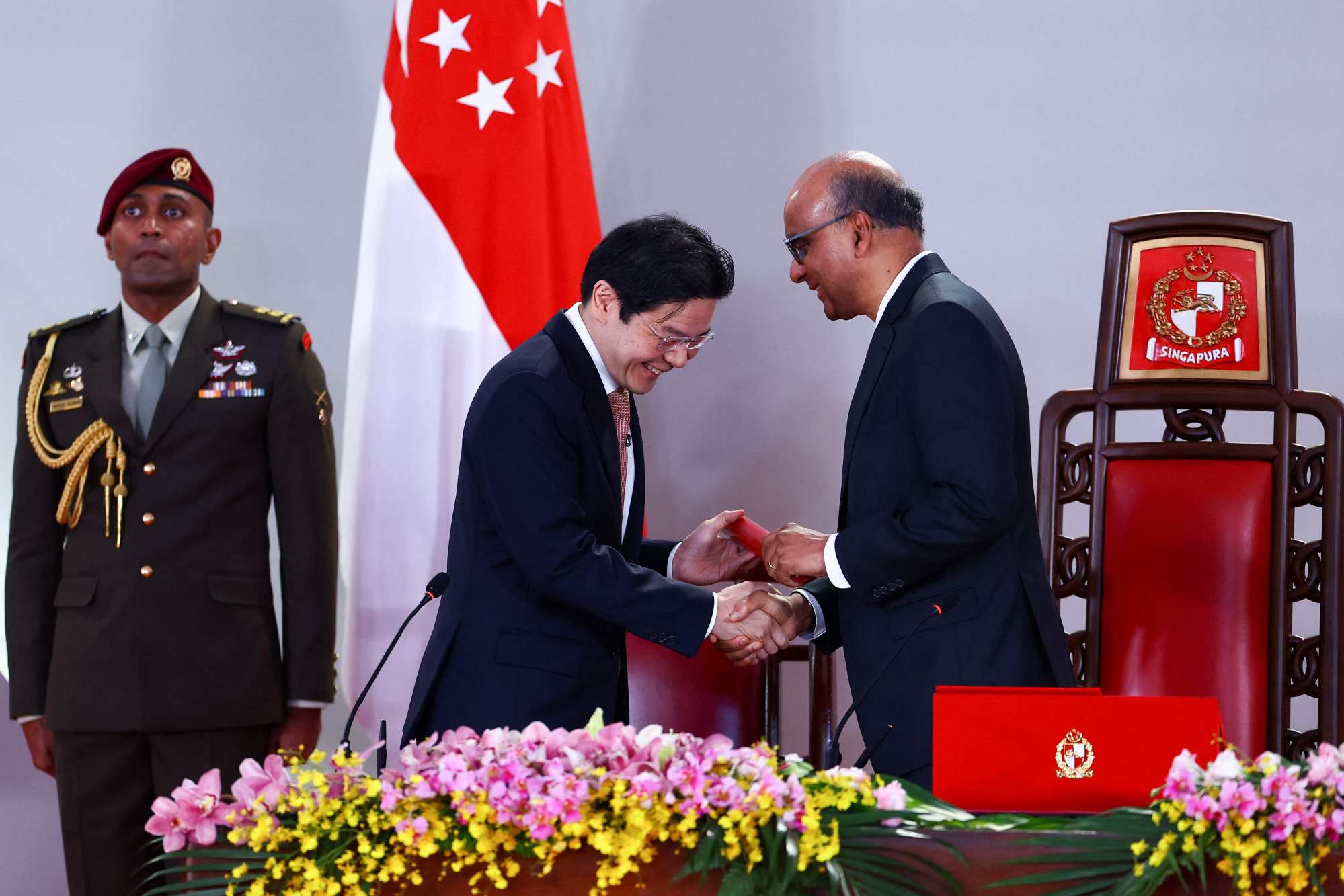Singapore cabinet sworn in as PM Lawrence Wong vows to steer country through new world order
Speaking at the Istana, Wong pledges to review and update Singapore’s economic strategies to meet the challenges of the new global landscape

Singapore’s Prime Minister Lawrence Wong pledged to chart a course through a world order he described as turbulent and uncertain, while promising a more consultative style of governance as his new cabinet was sworn in on Friday night.
Addressing 600 guests who gathered at the Istana lawn for the ceremony, Wong said that amid a turbulent world, “Singaporeans voted for a strong and stable government while re-electing opposition MPs in the constituencies they held”.
He described the result of the May 3 election as a “clear mandate”, with his People’s Action Party (PAP) returning to power with a “strengthened majority” from the last election.
“This outcome reflects the collective desire of Singaporeans in these uncertain times – you understood what was at stake, our vulnerability and our future. You chose leaders you could trust, a government you could rely on and a steady course for our nation’s next phase of development,” he said.
This would serve as a “clear advantage” for the country when conducting foreign policy, he added.
Earlier this week, Wong announced his new cabinet line-up, with key changes including former education minister Chan Chun Sing filling the defence spot, and two newly elected faces, former senior civil servant Jeffrey Siow and ex-chief of army David Neo, becoming acting ministers for transport and culture, respectively.
Observers noted the portfolio shifts and omissions marked Wong’s responsiveness to the people’s mandate and his focus on electoral success.

During his speech on Friday, Wong said that he saw the merits of a more open society, with a greater diversity of voices.
“We will actively involve you in creating and implementing solutions that matter to you and your families – this is how my team and I will govern in partnership with Singaporeans, everyone will have a say in shaping our way forward and building our shared future,” he said.
The swearing-in ceremony comes just weeks after his party’s decisive victory at the May 3 general election, with the PAP winning 65.57 per cent of the vote and 87 out of 97 parliamentary seats, fending off stiff opposition from its main political adversary, the Workers’ Party (WP).
The PAP had based its campaign on the need for stability amid economic headwinds, with analysts saying Singaporeans had voted with a “flight-to-safety” mindset at the ballot box.
On Thursday, Singapore warned of the risk of a technical recession due to global tariff tensions.
The trade and industry ministry said in its final estimate that the city-state’s gross domestic product grew 3.9 per cent in the first quarter to March, from a year earlier. The ministry also maintained a recently downgraded forecast for 2025 GDP growth at 0 per cent to 2 per cent due to Washington’s tariffs and its impact on global trade.
Wong pledged to review and update Singapore’s economic strategies for this new global landscape, committing to work with tripartite partners “to develop a new economic blueprint for our next phase”.
This would go towards maintaining Singapore’s competitive edge and creating good jobs for Singaporeans, he added.

More measures would go into enhancing social support systems to provide “greater assurance” to Singaporeans in different stages of life, he said.
On the global front, Wong said that Singapore would strengthen ties with partners “near and far”, while seeking new partnership opportunities in other parts of the world, such as Africa and South America.
“In a world of shifting alliances, we will be a steady and constructive partner, one willing and able to contribute to peace and stability, to advance dialogue and fraternity and support a rules-based global order,” he said.
Among other cabinet changes, Wong had retained Trade and Industry Minister Gan Kim Yong as his sole deputy, following in the footsteps of his predecessor Lee Hsien Loong. There are typically two deputy prime ministers in Singapore but it is not unprecedented for its cabinet to have one, as was the case most recently when Heng Swee Keat, initially chosen to succeed Lee, was the only deputy between 2019 and 2022.
His new cabinet line-up also saw the introduction of three coordinating ministers, with two of them from the fourth-generation leadership, known locally as 4G – Chan, who is the coordinating minister for public services, and Health Minister Ong Ye Kung, who is the coordinating minister for social policies.
Other changes to the line-up include former national development minister Desmond Lee moving to the education ministry, former transport minister Chee Hong Tat replacing Lee as national development minister and former culture minister Edwin Tong helming the law ministry after long-term minister K Shanmugam relinquished the portfolio.
Shanmugam remains in charge of home affairs and is also the coordinating minister for national security.
Meanwhile, former minister-in-charge of Muslim Affairs Masagos Zulkifli, whose team narrowly defeated their WP opponents in Tampines by 52.02 per cent of the vote, has handed his role to Faishal Ibrahim, who is acting minister. Faishal is also senior minister of state for home affairs.
Labour chief and former minister Ng Chee Meng was not named in the cabinet. Ng, who previously requested not to be considered for any ministerial role, has said he would focus on his duties as Jalan Kayu MP and secretary general of the National Trades Union Congress.
On Wednesday, Wong told local reporters that a labour chief had traditionally held a position in cabinet. He added: “To be clear, this is a temporary arrangement, and I look forward to having the labour chief being part of the cabinet before too long.”

Speaking before the cabinet’s swearing in, President Tharman Shanmugaratnam said the results of the election reflected the political aspirations of voters, as they had the responsibility to decide on the political leadership that would chart Singapore’s next chapter.
“Singaporeans expressed their views on the political landscape they wished to see. They preferred the strongest team possible to govern Singapore, even as they chose to maintain alternative voices in Parliament,” Tharman said.
He also spoke about a global order characterised by strategic rivalries between major powers, a fragmented global economy and an erosion of multilateralism.
“Narrower, more nationalistic and opportunistic approaches to trade and diplomacy are taking hold. More than most, small states like Singapore will feel the weight of these geopolitical cross currents,” he said, adding that the trade-reliant hub’s wellbeing had always depended on a “stable, rules-based international order”.
“There is no telling whether this global disorder will eventually subside. But there is no returning to the world we knew over our first 60 years of nationhood.”
Other long-term challenges, such as an ageing population, were not just a challenge for the government, but for all citizens, Tharman warned, underscoring the importance of solidarity and unity in the face of divisive forces.
The PAP has ruled Singapore for an uninterrupted 59 years in what is effectively a one-party dominant system. The May 3 election was Wong’s first as prime minister, held about a year after he took over the reins from Lee Hsien Loong last May.